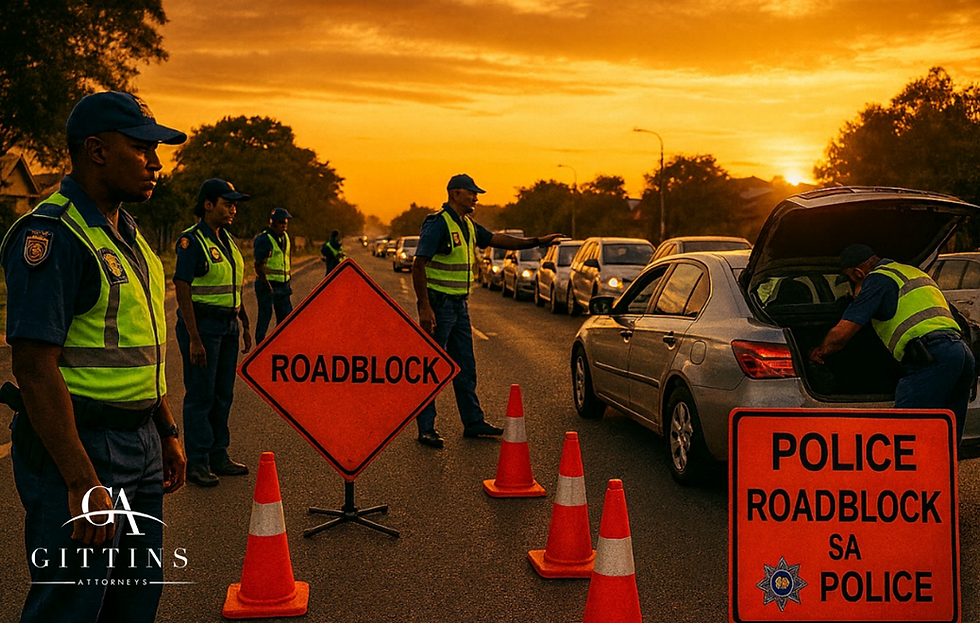VICTIMS ABROAD, CRIMINALS AT HOME: SOUTH AFRICAN SCAM COMPANIES
- Gittins Attorneys Law Firm

- Jun 17
- 4 min read
Updated: Sep 10

Introduction
In recent years, South Africa has gained unwanted attention for being a base of operations for companies running international scams. These businesses – sometimes appearing legitimate on the surface – are often used to target and defraud foreign victims through fake investment platforms, online stores, or fraudulent service offerings.
But what happens when the scam is perpetrated in South Africa and the victim is overseas? This article explores the mechanisms available under South African law to report, investigate, and prosecute scam companies operating within its borders, and what options exist for victims outside the country.
The Typical Setup: Local Scam, Global Reach
These scam companies often:
Register with the Companies and Intellectual Property Commission (CIPC);
Create professional-looking websites and social media pages;
Use South African contact numbers and banking details; and
Lure victims through international ads or email campaigns.
Once payment is made, the company vanishes, never delivers the service/product, or continues to defraud through "follow-up fees." These schemes target individuals and businesses across Europe, the UK, Asia, the US, and the rest of Africa.
What Can Foreign Victims Do?
While victims outside South Africa may feel powerless, there are several steps they can take to initiate investigation or recovery.
1. File a Complaint with SAPS Cybercrime Unit
South Africa’s Cybercrimes Act 19 of 2020 empowers the South African Police Service (SAPS) to investigate cyber-related fraud – even if the victim is not in the country.
Foreign victims can:
Report the crime via the nearest South African embassy or consulate;
File a complaint directly with SAPS (via email or online, depending on the case); and
Request assistance from their own national police force, which may relay information to South Africa under international cooperation frameworks.
The Cybercrimes Act allows South African authorities to investigate offences that were committed locally but affected victims internationally.
2. Report the Company to the CIPC
The Companies and Intellectual Property Commission (CIPC) governs company registration and compliance in South Africa.
Victims can:
Search for the company on the CIPC database (www.cipc.co.za);
Lodge a formal complaint if the company is trading fraudulently or misrepresenting itself; and
Request investigation under section 22 of the Companies Act, which prohibits reckless or fraudulent trading.
Although CIPC does not prosecute crimes, it may deregister a company or refer it to law enforcement if serious fraud is suspected.
3. Approach the Financial Sector Conduct Authority (FSCA)
If the scam involves:
Financial advice;
Investment opportunities; or
Trading platforms,
then the FSCA is the correct regulatory authority. It investigates unlicensed or dishonest financial service providers.
Victims should check whether the company is registered as a Financial Services Provider (FSP) on the FSCA database, and if not, report the matter using the FSCA’s fraud complaint channels.
4. Use International Legal Cooperation
Foreign governments may rely on Mutual Legal Assistance Treaties (MLATs) or Interpol to pursue suspects located in South Africa. Under these frameworks, South African authorities can:
Execute search warrants;
Freeze or seize assets;
Arrest suspects; and
Extradite individuals (if bilateral treaties exist).
The National Prosecuting Authority (NPA) and Asset Forfeiture Unit (AFU) also play key roles in asset recovery and prosecution.
5. Civil Remedies via Local Attorneys
Victims may also choose to institute a civil claim in South African courts through a local attorney. Remedies may include:
Damages for misrepresentation or breach of contract;
Freezing of bank accounts or tracing assets; or
Interdicts to prevent further harm.
This route depends on the availability of identifiable individuals or assets within the country and may require affidavits, evidence of payment, and proof of the fraud.
Legal Framework That Supports Prosecution
South African law has sufficient tools to investigate these scams:
Cybercrimes Act 19 of 2020 – criminalises data fraud, phishing, and online deception.
Prevention of Organised Crime Act (POCA) – allows for investigation of criminal syndicates and asset seizures.
Companies Act 71 of 2008 – addresses corporate fraud and director liability.
Electronic Communications and Transactions Act (ECTA) – provides for prosecution of e-commerce fraud.
Common law fraud – still applicable for prosecuting intentional misrepresentation
Challenges and Gaps
Despite a strong legal framework, there are practical barriers:
Under-resourced law enforcement for white-collar and cybercrime;
Delay in processing complaints from foreign nationals;
Difficulty tracing assets once moved or laundered; and
Use of front companies and nominee directors to obscure liability.
Additionally, enforcement often depends on whether the scam has gained enough attention or involves significant financial losses to trigger formal investigation.
Conclusion
While the internet has enabled South African scammers to reach victims across the globe, it has also created a trail that can be followed — through digital forensics, financial tracing, and legal cooperation.
Foreign victims are not without remedies. With the right reporting channels, legal support, and pressure on regulators, it is possible to hold South African scam companies accountable.
The country has both a legal and moral obligation to ensure its territory is not used as a safe haven for cross-border fraud. Increased awareness, enforcement, and international cooperation are key to ending the impunity these criminals currently enjoy.



Comments